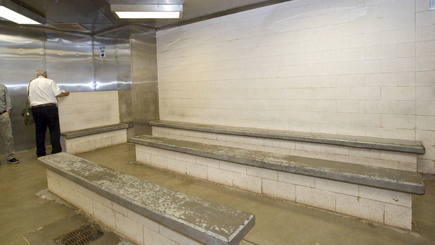The American Immigration Council, the National Immigration Law Center, the ACLU of Arizona, the Lawyers’ Committee for Civil Rights of the San Francisco Bay Area, and Morrison & Foerster LLP filed a class-action lawsuit challenging detention conditions in U.S. Customs and Border Protection (CBP) detention facilities. The complaint alleges that Tucson Sector Border Patrol holds men, women, and children in freezing, overcrowded, and filthy cells for days at a time in violation of the U.S. Constitution. Detained individuals are: stripped of outer layers of clothing and forced to suffer in brutally cold temperatures; deprived of beds, bedding, and sleep; denied adequate food, water, medicine and medical care, and basic sanitation and hygiene items such as soap, sufficient toilet paper, sanitary napkins, diapers, and showers; and held virtually incommunicado in these conditions for days.
Plaintiffs in the suit are two women detained in the Tucson Border Patrol Station as well as a Tucson man detained twice in that facility. All Plaintiffs consistently recount days of mistreatment and neglect during their time in Border Patrol holding cells; their accounts are fully consistent with dozens of former detainees interviewed prior to filing the suit.
The District Court certified a class consisting of all individuals who are or will be detained by the U.S. Border Patrol in the Tucson Sector, and, in 2016, granted Plaintiffs’ motion for a preliminary injunction. Among other things, the Court ordered Border Patrol to provide all class members detained for 12 or more hours with a mat to sleep on, supply sufficient toiletries and bathing wipes to all class members, and ensure that all were provided meals at regular intervals and clean drinking water.
Following a seven-day trial in January 2020, the District Court granted Plaintiffs’ request for a permanent injunction finding that the conditions in detention facilities in Border Patrol’s Tucson Sector violate the U.S. Constitution. Under the court’s ruling, migrants may not be detained in these facilities for more than 48 hours, unless Border Patrol provides for their “basic human needs.” In addition to the requirements imposed under the preliminary injunction, further requirements imposed by the court after 48 hours include providing:
- a bed with a blanket;
- access to food that meets acceptable dietary standards and potable water; and
- a medical assessment by a medical professional.
The court also clarified that the opportunity to shower, by definition, does not mean mere access to a “paper-shower” or “shower-wipe” and that Border Patrol must ensure that overcrowding in the detention cells does not result in migrants having to sleep in the toilet areas. On April 17, 2020, the court issued an order for permanent injunction specifying the exact terms governing how the court’s ruling will be implemented. Defendants have ninety days to fully comply with the court’s order.




